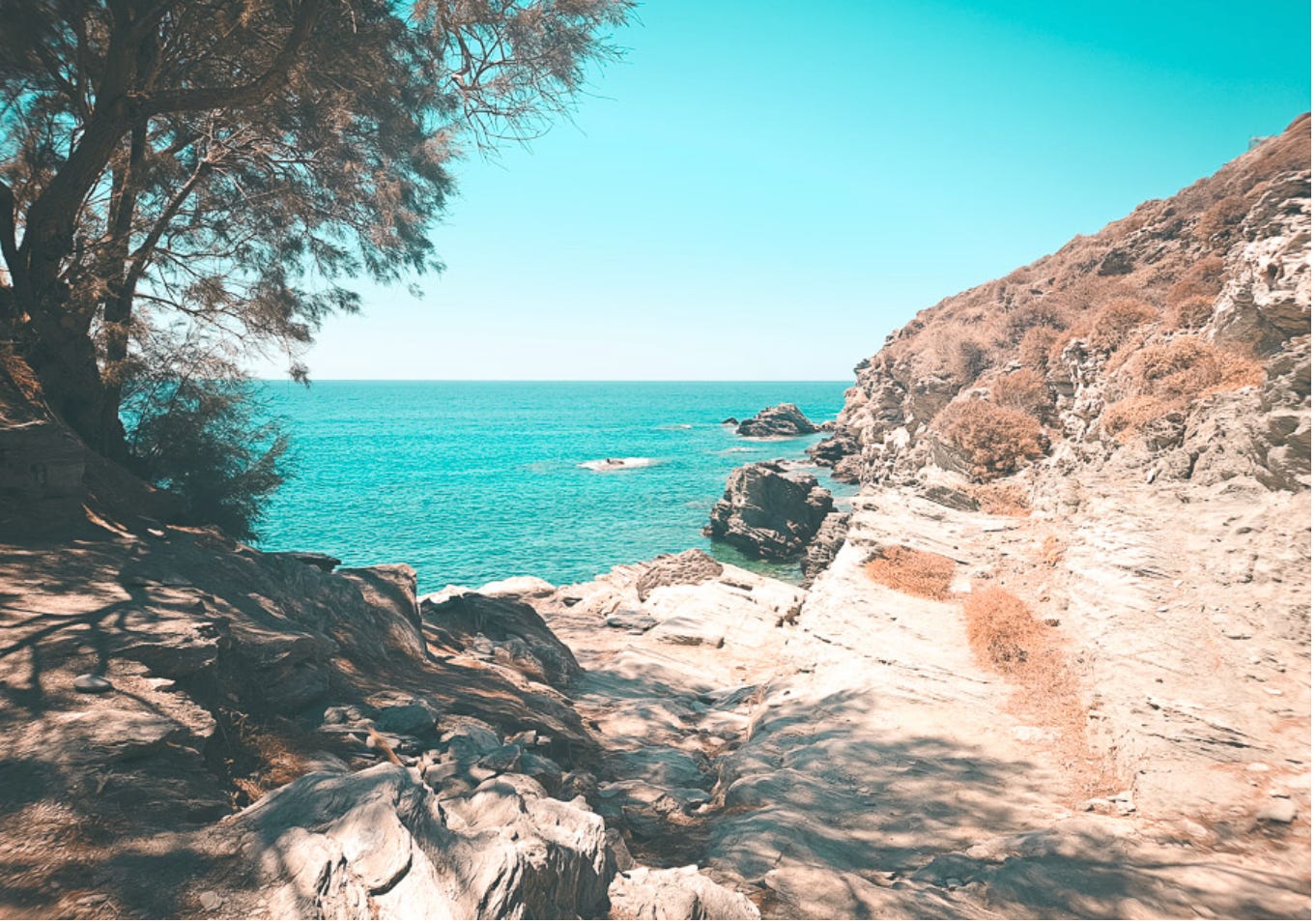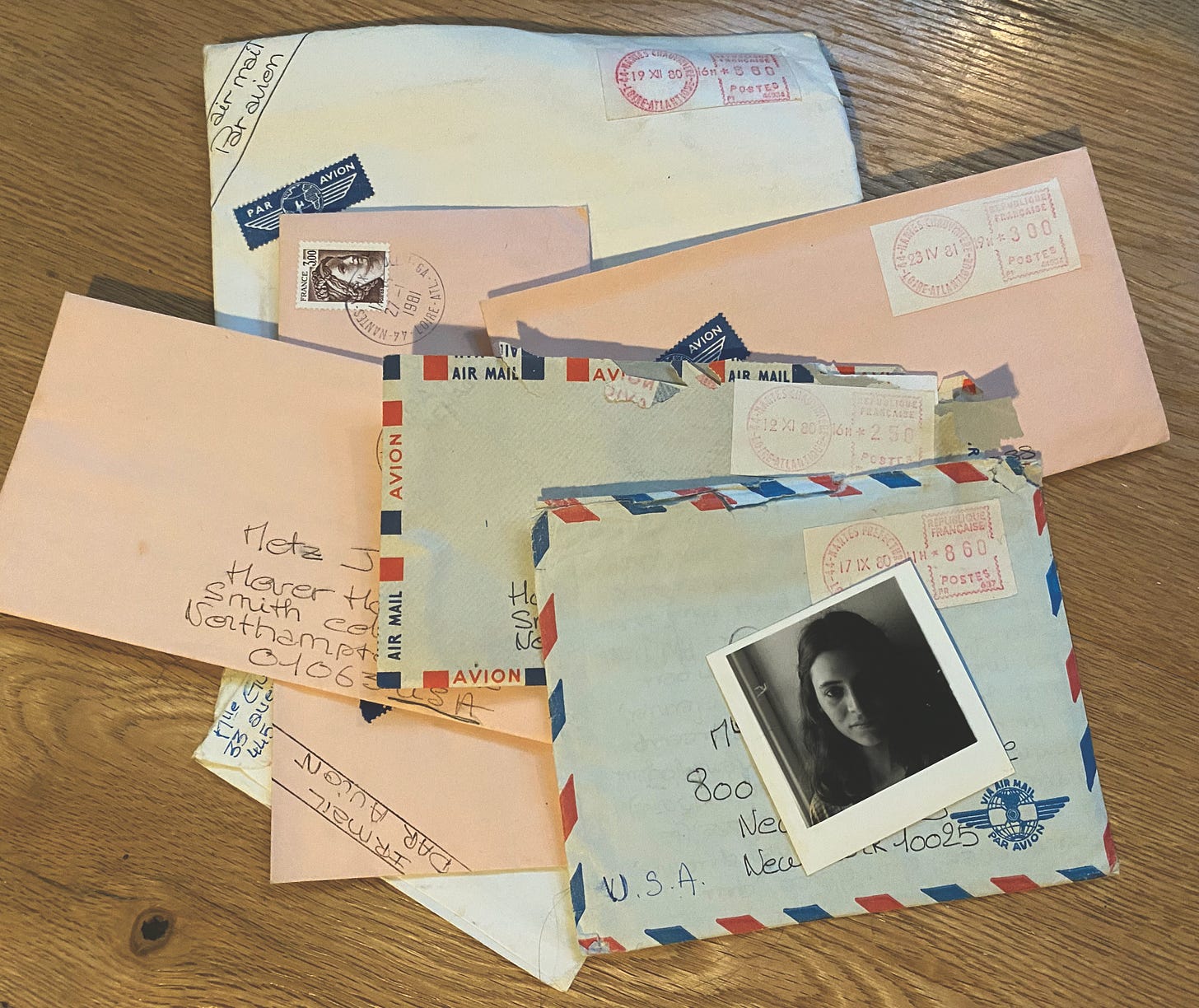Dreaming in Another Language
The best French I ever spoke was on an island in Greece.
The young woman seemed to be about my age—21—squashed next to me on a ferry from Athens to a small island called Folegandros. It was July and hot. So hot that even with the wind blowing sea spray in my face, I was sweating in one of the few items of clothing I’d brought along from my student year in Paris, a vintage white nightgown belted with a colorful scarf. I’d shipped most of my belongings home, including the heavy 35mm camera I’d borrowed from my father. I wanted to travel as light as possible, without feeling a need to document the journey as a tourist. The written account of this summer survives in a small journal and in postcards I mailed to my parents and friends.
I’d been in Athens a week. I’d bought a sun hat, seen the Acropolis, and slept on the roof of a cheap hotel where a whole lot of us kids paid next to nothing, even less than a hostel. After a week, I was ready to leave the burning city. I loved islands and I loved a boat ride.
I could tell the woman was French before she said a word to me. Long blonde hair and straight-cut bangs, a look I’d seen everywhere during my time in Paris. She wore a blue and white striped t-shirt. Under her sunhat, her cheeks were dotted with golden freckles.
During the past year, I’d tried to acquire some Parisian style, rummaging at the flea market on the north edge of the city. I’d also worked hard to shed my flat American vowels at a language lab. We students sat in cubicles and listened to a woman’s voice recite excerpts that included some of the most commonly mispronounced sounds, and then attempted to imitate her pronunciation. I can still remember a line from a text by Antoine de Saint-Exupéry: Il était, quelque part, un parc chargé de sapins noirs et de tilleuls… “There was, somewhere, a park filled with black pines and linden trees.” This short phrase includes so many danger zones: the imperfect “ait,” silent consonants, throaty r’s, and that mouthful at the end, tilleuls.
“Avancez les levres,” the recorded female voice urged us, repeatedly. Push out your lips. I formed my mouth into a lewd pucker, like Mick Jagger crooning I’m so in love with you. To speak French without causing aural offense to native speakers I had to pretend I was kissing someone, even that cranky lady behind the counter at the boulangerie where I bought my croissants. In the privacy of the lab booth, I closed my eyes and smooched the air. After our lessons, my cheek muscles ached, like after a make-out session.
After a time, I’d overhear shopkeepers damning my accent with faint praise. “Maybe she’s Spanish,” said one, the corner of her mouth curling into a bemused sneer. “Or Italian?” said her companion. On another occasion, I overheard the somewhat kinder, “She must be from, you know, somewhere in the provinces.” I accepted the compliment; at least they didn’t think I was American. In 1980, Americans were not so beloved in Europe.
Each morning, she greeted me in English, but soon enough, Valérie and I bantered like old friends in French with clarifying hand gestures. She taught me slang and curses I couldn’t wait to try out when I returned to France. She was kind and cheerful and generous, told good stories, kept me out of trouble (too much retsina), and was in all ways a perfect travel companion. I knew after one day how much I would miss her when we separated.
The young woman smiled at me as the ferry boat bounced along the waves, her warmth so welcome after a mostly solitary month. Her name was Valérie. She liked my name as it was spelled the same in French, though pronounced with a “zh” sound at the beginning. Zhulie. (“Avancez les levres!”) Valérie asked me to speak in English as she was trying to improve her skills. But we ran into communication breakdown right away, because her accent was so strong that I couldn’t understand her, at least not over the roar of the boat engine. So, we slipped into French and she seemed grateful. She asked where I was planning to stay on the island. While most of my summer traveling had been without a fixed itinerary, for this part of my journey I was following clear instructions, sent to me in a blue airmail letter by a college friend who had visited this island the previous summer.
Take the ferry to the island but do not stay in the port town. Instead, take the public bus to the town on the opposite side of the island. Find a cheap room. Don’t spend more than ten dollars. Then take a walk along the main street. It’s tiny, unpaved. There’s a bakery right near the center of the village. Try the bread, it’s very good. You’ll see a row of five tavernas. Go to the very last taverna and there you will see a waiter, the most beautiful man in the world.
Valérie laughed. “Well, now we have to go there. Allons-y!”
It was settled. We took the bus to the other town, a bumpy nausea-inducing trip on a dusty road. Once we arrived, we found a rented room in the home of an older woman, who spoke neither French nor English. She indicated the number of drachmas we would pay with her fingers. If we shared the room, we would spend about five dollars each. There was one bed, a tiny sink, two chairs, a small table. The woman pointed to a bucket of well water, a few leaves bobbing on the surface like tiny fishing boats. For washing, the woman explained, using hand language. There was no shower or bath. The toilet in the hall was a hole in the floor and the roll of paper was as rough as the stuff used used to wrap up meat and cheese at markets, but by then I was used to squatting.
We dropped our bags and out we went to buy bread, cheese, drinking water, some fruit. We saved the best part for last. As evening fell, we walked to the last taverna on the main road. I spotted him from twenty feet away. Never had I ever, and never have I since, seen such a beautiful man. The best part was that he had grown up in such isolation on this small island that he seemed unaware of his classic gorgeousness. Even carrying a tray of dirty dishes, he looked like one of the heroic statues I’d often admired at the Metropolitan Museum. During the week we spent on the island, I learned how to order water, bread, orange juice, a boiled egg, grilled fish, cucumber salad, feta cheese. We drank dark syrupy coffee with a fine muddy layer of grounds at the bottom of the cup. Like Turkish coffee, but since the Greeks didn’t get along with the Turks, it was Greek kafé— an acquired taste that we acquired, as the only other option was instant Nescafé. At night, we indulged in retsina. The waiter was not wearing a ring and no girlfriend appeared. He was always polite and friendly but it became clear that nothing would ever happen. And so, in this way, I could relax, stop trying and just enjoy his beauty.
Each morning, she greeted me in English, but soon enough, Valérie and I bantered like old friends in French with clarifying hand gestures. She taught me slang and curses I couldn’t wait to try out when I returned to France. She was kind and cheerful and generous, told good stories, kept me out of trouble (too much retsina), and was in all ways a perfect travel companion. I knew after one day how much I would miss her when we separated.
Some other travelers eating at the taverna told us about a secret beach away from most of the tourists, where we could skinny dip. We found the place nestled in a quiet cove, and empty, until some German boys arrived and disrobed. Valérie and I put our bathing suits back on. The boys were handsome, tanned all over, and topped with various shades of sun-kissed tousled hair, but they didn’t come close to the taverna waiter. One of them, Rainer, seemed attuned to our discomfort and kept his clothes on. He spoke both excellent French and English, but we kept our conversations in French to avoid isolating Valérie.
One morning, I woke up in our room and realized I’d been dreaming, and in French. I was reciting over and over and over the line by Saint-Exupéry… Il était, quelque part…where was this beautiful park with the pines and linden trees? The disembodied female voice, as familiar as my new friend, encouraged me, “avancez les levres!” As I pushed them out, I found myself at the taverna, puckered up and ready to kiss the handsome waiter, who appeared, carrying a pot of Greek kafé. Emerging from the dream, I laughed out loud at the creative power of my wishful thinking. It was time for our muddy coffee.
After a day or two she and I felt comfortable around the German boys and removed our bathing suits. I discovered the startling pleasure of floating naked in the super-salty Mediterranean, without effort, like a seal. At times, swaying in the gentle swells with my eyes closed, I drifted off into a liminal state between waking and sleeping, just aware enough to keep my face above the water. It was nothing like my childhood and adolescent summers in Maine on rocky beaches in bone-chilling water. By the end of the week our skin was brown, dusted with dry salt. The last few inches of my hair were hopelessly tangled and I asked Valérie to cut them off with my pocket knife.
One morning, I woke up in our room and realized I’d been dreaming, and in French. I was reciting over and over and over the line by Saint-Exupéry… Il était, quelque part…where was this beautiful park with the pines and linden trees? The disembodied female voice, as familiar as my new friend, encouraged me, “avancez les levres!” As I pushed them out, I found myself at the taverna, puckered up and ready to kiss the handsome waiter, who appeared, carrying a pot of Greek kafé. Emerging from the dream, I laughed out loud at the creative power of my wishful thinking. It was time for our muddy coffee.
Valérie and I stayed in touch for years after that. I looked forward to her rose-colored stationery addressed in her neat upright cursive. I moved many times in the decade that followed and, in the end, we lost each other, as so often happened before social media reconnected us to our lost loves, classmates, and people like Valérie, with whom I’d spent a week of my life. Perhaps she married and changed her name. Perhaps she moved far away. Perhaps she is no longer alive. I’ve not been able to find her. The only photo I had of her was lost in one of those moves. Never lost, that blissful experience of crossing over into another language. It’s happened a few times since then, also in dreams.








Reminds me of the time I started dreaming in Spanish, no longer translating but rather thinking in Spanish, and I knew I had arrived when I was able to tell a joke in Spanish and have my native listener laugh. Great story, thanks for sharing.
Such a wonderful piece! You show the beauty of multilingualism so well.